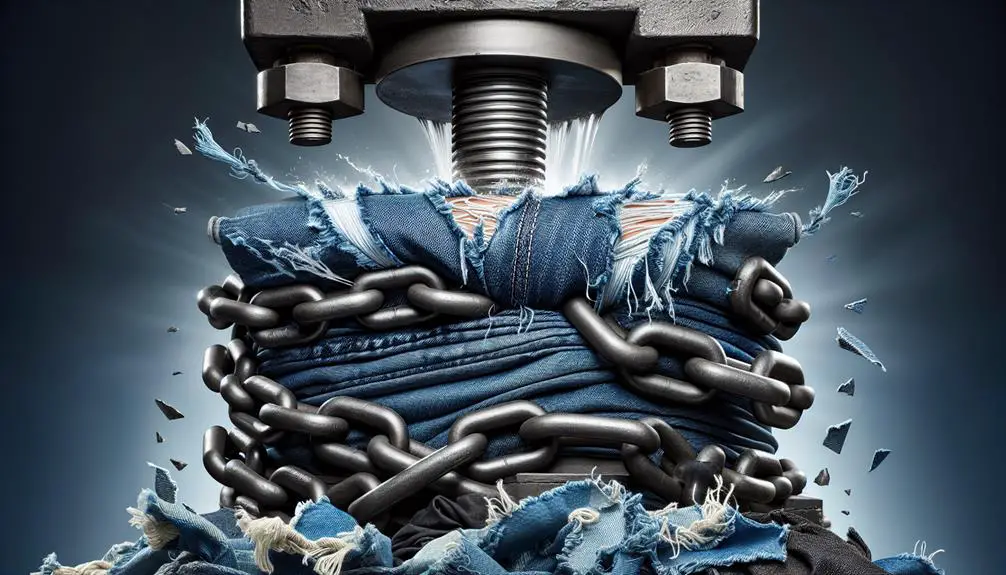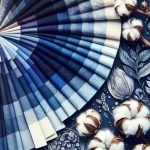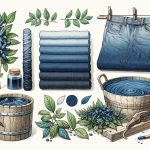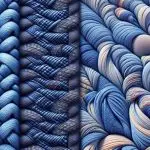I've always been fascinated by denim's rugged charm and seemingly indestructible nature. It's like the superhero of fabrics, isn't it? With its twill weave working overtime to fend off tears and its weight adding to its durability, you've got to wonder if there's anything stronger out there. But here's the kicker: the true strength of denim might not just be in its physical attributes. Consider the indigo dyeing process and those finishing touches that give it its iconic look and added resilience. Is denim the strongest fabric, or is there more to this story? Let's find out together.
Table of Contents
Key Takeaways
- Denim's twill weave and cotton construction enhance its strength and durability.
- The weight and thread count of denim contribute to its toughness.
- Quality yarn, especially ring-spun and combed cotton, forms a durable fabric base.
- Indigo dyeing and finishing processes, like mercerizing, increase denim's strength and longevity.
- While denim is highly durable, it is not the single strongest fabric, as materials like Kevlar offer superior strength.
The Weave of Denim
Denim's twill weave isn't just for looks; it's a key player in making your jeans tough as nails. This isn't your average fabric. We're talking about a cotton powerhouse, woven in a way that amps up its strength and durability to levels other fabrics can only dream of. The secret sauce? It's all in the twill weave. This method weaves the weft yarns over and under multiple warp yarns, creating a diagonal pattern that's not just for show. These diagonal lines and ridges you see? They're the frontline defense against tears and wear.
The twill weave gives denim a texture that's not only unique but practically screams durability. It's why your favorite pair of jeans can survive countless wears and washes, looking better with age. The indigo that colors them might fade into that beloved, lived-in look, but the fabric itself stands strong, thanks to that ingenious weave.
Weight and Durability
When it comes to rugged gear, the heft of denim plays a huge role in its ability to take a beating and come back for more. I've learned that the secret behind this resilience isn't just any one thing; it's a combo of factors starting with its weight. Heavier denims, thanks to their higher density and increased thread count, bring the thunder in terms of strength and durability. It's like they're built to last from the get-go.
The thing about denim is, its weight isn't just for show. It translates into real-world toughness. Whether we're talking workwear, those classic denim jackets, or even upholstery, the extra weight means it can stand up to rough use and countless washes without batting an eye. And let's not forget the magic touch of indigo dye. It's not just about that iconic blue hue; it actually plays a part in keeping denim strong and looking sharp over time. The cotton fibers, twill construction, and all those finishing treatments like preshrinking? They're all pieces of the puzzle that make denim a fabric heavyweight champion in terms of longevity.
Yarn Quality Matters
One often overlooks the fact that the yarn's quality is a game-changer in making denim tougher and more durable. When we dive into the details, it's clear that not all denim is created equal, and the secret starts with the yarn.
Ring-spun yarn, for example, is a big deal because it's twisted tighter than your average yarn, giving denim fabrics that extra bit of strength and durability we all crave.
Then there's combed cotton yarn, which goes through a combing process to get rid of shorter fibers, leaving behind the longer, stronger ones. This process is why some denim products feel like they could survive a tumble down a mountain without so much as a scratch. It's all about those longer cotton fibers creating a higher quality yarn that stands up to wear and tear like a champ.
And let's not forget about selvage denim, the heavyweight champion in the denim industry. It's renowned for its durability, and that's no accident. The yarn quality, including the use of ring-spun and combed cotton yarn, combined with a tight twill weave, makes selvage denim stand out for its strength and longevity. In the world of cotton fabrics and denim products, yarn quality isn't just a detail; it's the foundation of durability.
Indigo Dyeing Process
Although many focus on the fabric's weave and yarn quality, it's the indigo dyeing process that truly sets denim apart, ensuring its durability and unique color fade over time. The indigo dye seeps deep into the denim fibers, not just coating the surface but bonding with the material. This penetration is what gives denim its characteristic fading patterns that denim lovers go crazy for. It's not just about looks, though. This process adds to the fabric's strength and durability, meaning your favorite pair of jeans can withstand years of wear and still look amazing.
The signature blue color that comes from indigo dyeing is iconic in the fashion world. It's versatile, fitting into various fashion styles from rugged workwear to sleek urban chic. The longevity and visual appeal of denim fabric are largely thanks to the indigo dyeing process. It's what ensures that denim doesn't just last but ages gracefully, developing a personality of its own with each wear.
In essence, the indigo dyeing process isn't just a step in making denim; it's the heart of what makes denim fabric stand out in both durability and style. It's the secret behind those coveted fading patterns and the reason why denim remains a timeless choice in fashion.
Finishing Touches
After the indigo dyeing, finishing touches like preshrinking and mercerizing are key to a pair of jeans' longevity and appeal. Let's get into it. The preshrunk treatment is a game-changer. It literally pre-shrinks the fabric, so you don't end up with a pair of jeans that fit your little cousin after the first wash. This step is crucial for maintaining fabric longevity, ensuring your denim stays true to size and shape.
Then there's mercerizing, which sounds fancy because, well, it kinda is. This involves treating denim with sodium hydroxide, boosting its strength and giving it a bit more stretch for durability. It's like a gym workout for your jeans, making them tough and resilient.
We can't forget about satin denim and other specialized treatments. These finishing treatments, including resin applications, are all about enhancing denim durability. Satin denim, for instance, holds its shape thanks to these manufacturing treatments, making your jeans look freshly bought even after several wears.
All these treatments play a massive role in denim manufacturing. They're not just afterthoughts; they're essential steps that contribute to the fabric's longevity and resilience. It's these finishing touches that help your denim stand the test of time and wear.
Frequently Asked Questions
Is Denim the Most Durable Fabric?
I've always wondered if denim's the most durable fabric. Given its twill weave, high thread count, and tough treatments, it's super strong. But, there might be stronger ones out there, depending on the use.
Is Denim Stronger Than Cotton?
I've learned that denim is stronger than cotton because of its twill weave, which adds tear resistance and durability. Denim's thickness and quality fibers also play a big role in its superior strength.
What Makes Denim so Strong?
I've learned that denim's strength lies in its twill weave, creating a durable diagonal pattern. It's also about how weft yarns cross multiple warp yarns, and high-quality materials like ring-spun cotton boost its toughness.
Is Denim Made of 100% Cotton?
Yes, I've learned that denim is typically made from 100% cotton. This not only gives it its tough and durable qualities but also ensures it's comfortable and breathable, perfect for everyday wear.
- The Use of Nonwovens in Construction and Civil Engineering - July 11, 2025
- The Use of Nonwovens in Construction and Civil Engineering - July 11, 2025
- The Use of Nonwovens in Construction and Civil Engineering - July 11, 2025






